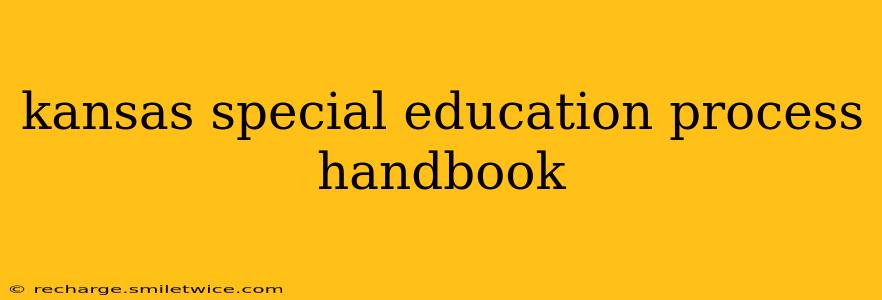Navigating the special education system can be challenging, especially in a state like Kansas with its unique regulations and procedures. This handbook aims to provide a clear and comprehensive overview of the special education process in Kansas, empowering parents and educators to advocate effectively for students with disabilities. This guide will address key aspects of the process, ensuring you're well-equipped to understand your rights and responsibilities.
What is Special Education in Kansas?
Special education in Kansas, governed by the Individuals with Disabilities Education Act (IDEA), provides individualized support and services to students with disabilities aged 3-21. These services aim to meet each student's unique needs and help them reach their full potential in a supportive learning environment. The Kansas State Department of Education (KSDE) oversees the implementation of IDEA within the state, providing resources and guidance to schools and districts.
The Evaluation Process: Identifying Special Education Needs
The process begins with a referral, often initiated by parents, teachers, or other school personnel who observe a significant discrepancy between a student's expected performance and their actual academic or behavioral progress. This referral triggers a comprehensive evaluation, including:
- Review of Existing Data: School records, including academic performance, attendance, and behavioral reports, are reviewed.
- Parent Input: Parents are crucial partners in the evaluation process and have a right to participate fully.
- Multidisciplinary Team Evaluation: A team of professionals, such as teachers, psychologists, speech-language pathologists, and occupational therapists, will conduct assessments. These evaluations often include cognitive testing, academic achievement testing, and behavioral observations.
- Report and Recommendations: The evaluation team compiles a report summarizing findings and recommending appropriate services and placements.
What types of evaluations are conducted?
Evaluations in Kansas are comprehensive and designed to identify the specific needs of each student. They may include, but are not limited to:
- Cognitive assessments: To assess intellectual abilities.
- Academic achievement tests: To measure performance in reading, math, and other subjects.
- Behavioral observations: To identify patterns of behavior that may be impacting learning.
- Speech and language evaluations: To assess communication skills.
- Occupational therapy evaluations: To assess fine motor skills and adaptive functioning.
The Individualized Education Program (IEP): Creating a Personalized Learning Plan
Once a student is determined eligible for special education services, an Individualized Education Program (IEP) is developed. This is a legally binding document outlining the student's specific learning goals, the services they will receive, and the methods for measuring their progress. The IEP is a collaborative effort involving parents, educators, and the student (when appropriate).
What are the key components of an IEP?
A comprehensive IEP includes:
- Present Levels of Performance (PLP): A description of the student's current academic, social, and developmental functioning.
- Goals and Objectives: Measurable and achievable goals for the student.
- Services and Supports: A detailed plan specifying the type, frequency, and duration of services.
- Placement: The educational setting where services will be provided.
- Evaluation Methods: Methods for monitoring the student's progress and evaluating the effectiveness of the IEP.
Dispute Resolution: Addressing Concerns and Differences
Disagreements may arise regarding a student's eligibility, IEP development, or placement. Kansas offers several options for resolving disputes:
- Mediation: A neutral third party helps parents and school personnel reach a mutually acceptable agreement.
- Due Process Hearing: A formal hearing before an impartial hearing officer to resolve disagreements.
How can I file a complaint about my child's special education services?
If you disagree with any aspect of your child's special education program, you should first attempt to resolve the issue informally with your child's teacher or school administrator. If this is unsuccessful, you can request mediation or a due process hearing through your local education agency (LEA). Detailed instructions on how to initiate these processes are usually available on the LEA website or through your child's school.
Parent Rights and Responsibilities in Kansas Special Education
Parents play a crucial role in the special education process. Kansas law guarantees parents several key rights, including:
- The right to participate in all IEP meetings.
- The right to examine all records related to their child's education.
- The right to receive written notice of proposed changes to their child's IEP.
- The right to request an independent educational evaluation (IEE).
What resources are available to parents of children with special needs in Kansas?
The Kansas State Department of Education (KSDE) provides numerous resources for parents, including publications, websites, and training opportunities. Parents can also connect with parent advocacy groups for support and information. Many local organizations offer services and support for families of children with disabilities.
This handbook provides a general overview; for specific details and the most up-to-date information, always refer to the official Kansas State Department of Education website and relevant legal documents. Remember, proactive involvement and informed advocacy are essential for ensuring your child receives the appropriate special education services they need to thrive.
